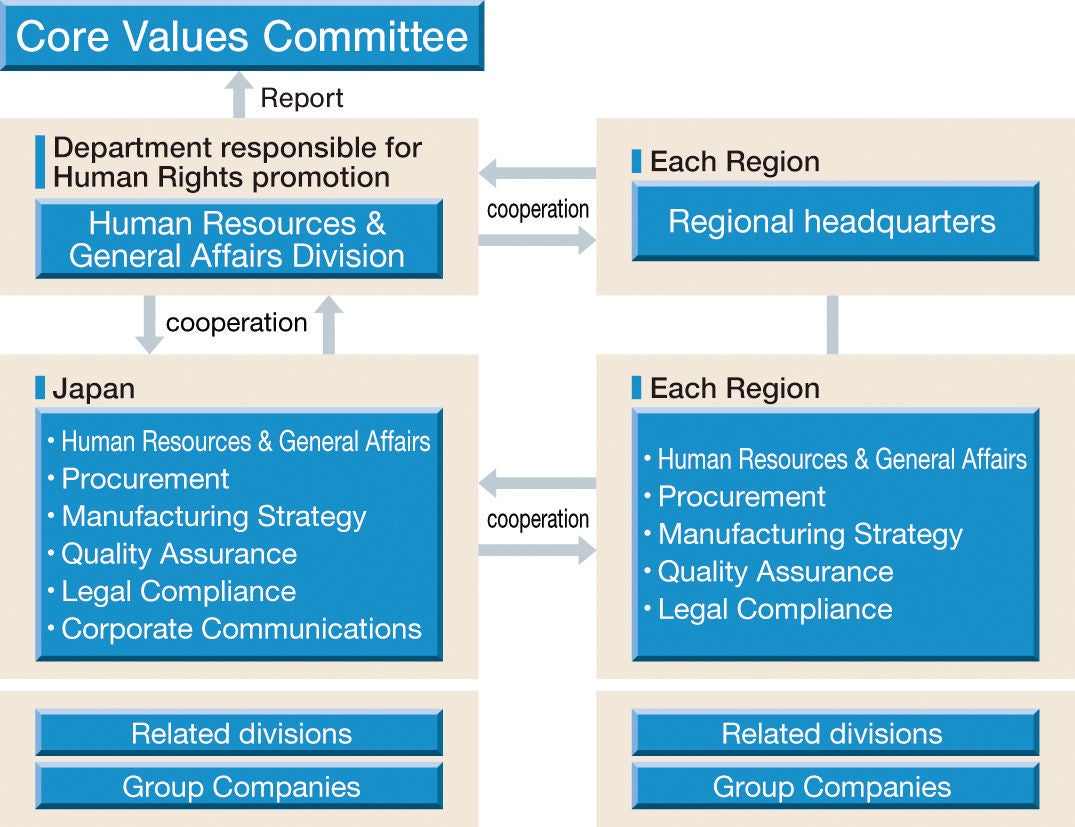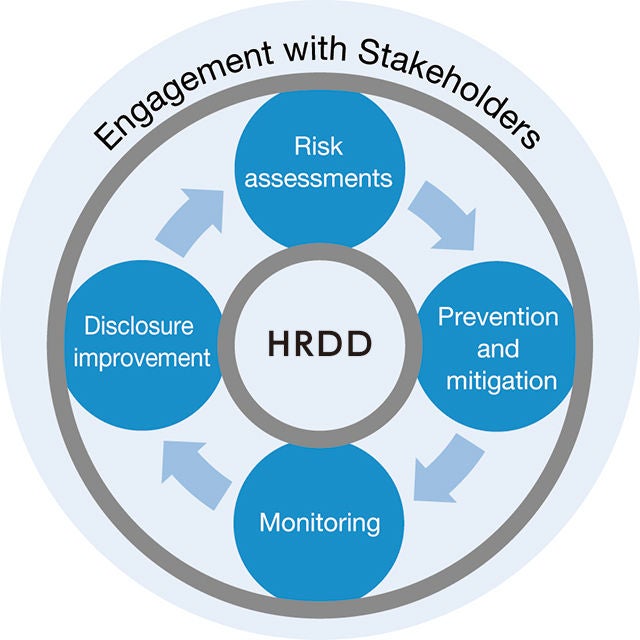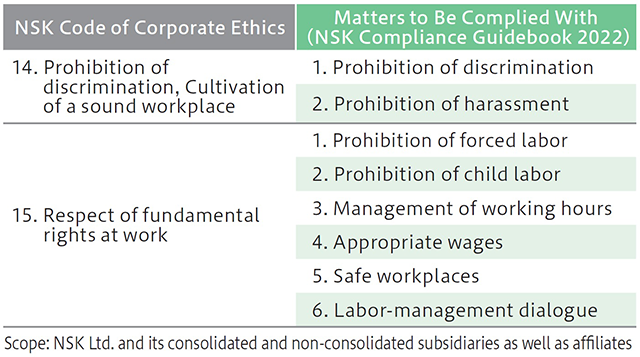Respecting Human Rights
NSK’s Approach
NSK believes that respecting human rights is our responsibility as a global company, and that it is essential to support and respect international norms, such as the Universal Declaration of Human Rights and the Guiding Principles on Business and Human Rights.
The NSK Code of Corporate Ethics clearly stipulates that we do not tolerate discrimination or violations of human rights (forced labor, child labor, etc.) for any reason. Furthermore, we established the NSK Human Rights Policy in October 2022 to better clarify our approach to human rights in order to facilitate further initiatives. In accordance with the policy, we respect the human rights of our stakeholders and work with our suppliers on efforts to evaluate, prevent, and mitigate impacts on human rights in line with international norms.
System
The person responsible for promoting the NSK Group’s human rights initiatives is the Executive Officer serving as the head of the Human Resources and General Affairs Division HQ and the head of the Legal and Compliance Division HQ (as of September 2024). This role includes the responsibility of strengthening human rights risk management across the NSK Group. And, each functional headquarters, including human resources and general affairs, procurement, manufacturing strategy, quality assurance, and legal and compliance, collaborates globally in the practice of human rights due diligence (HRDD) for both the NSK Group and suppliers.
In addition, the Human Resources and General Affairs Division HQ, which is the organization responsible for promoting the Group’s human rights initiatives, shares and discusses regional issues with regional headquarters outside Japan to develop responsive measures, too. It also promotes human rights education for all global employees. Moreover, it regularly holds NSK Human Rights Meetings as a venue for sharing information across the Group. Important matters discussed at these meetings and progress on HRDD initiatives are reported to the Core Values Committee.

Human Rights Due Diligence Initiatives
In FY2021, the NSK Group identified its key human rights risks with reference to human rights issues expressly stated in its codes and guidelines, information and indications from Japan’s Ministry of Justice, NGOs, research firms, and major customer CSR guidelines. In FY2022, we conducted 14 interview sessions with external experts and NSK’s several functional division headquarters in Japan and regional headquarters outside Japan. Considering human rights risk cases emerging in related industries and the lists of corporate efforts evaluated by international initiatives, we identified NSK’s key human rights risks and assessed their priority level (likelihood of occurrence x severity).
Providing human rights education for NSK Group employees, in FY2023 we held e-learning for employees in and outside Japan, with approximately 12,000 participants. We also held training in Japan for individual job levels and target groups (for newly hired employees, managers, sales staff, and employees posted overseas), with approximately 900 participants.
We work with our suppliers in the area of human rights due diligence initiatives. In FY2023, we distributed a video on the NSK Human Rights Policy and initiatives to over 200 suppliers in Japan. We also requested suppliers outside Japan to conduct self-assessments on human resources, labor, safety and health, the environment, and other areas, and we provided feedback on the results to each company.

Issues to Address/Mitigation Measures
◆Human Rights and Labor
In FY2023, we implemented self-assessments at 13 Group companies in Japan and 39 plants/companies in 15 other countries. The issues covered as human rights risks included discrimination in employment, child labor, forced labor, working conditions, and occupational safety and health, etc.
(Specific Examples of Verification)
Discrimination in employment
- The existence of clear policies and systems to prevent discrimination in the employment and treatment of employees on the basis of race, ethnicity, gender, language, religion or other opinion, national or social origin, property, birth or other status.
- The establishment of a harassment consultation channel and a grievance-handling channel. Provision of an awareness/training program on harassment for employees and its regular revision.
Child labor
- Non-engagement in child labor and other human rights violations and the existence of a policy and system to prevent it.
- Non-engagement in forced labor and other human rights violations and the existence of a policy and system to prevent it.
Working conditions
- Management of working hours (maximum overtime hours, etc.) and payment of appropriate wages (minimum wage, etc.) in accordance with the legal system of each country and regular checks and revisions.
Occupational safety and health
- Prioritization of workplace safety and health programs and policies and efforts to prevent accidents and injuries through both physical measures and education and training.
◆Labor-Management Relations Based on Dialogue
For NSK to grow sustainably as a corporate group committed to high-quality manufacturing, we believe it important to look at employment from a long-term perspective and to continuously hire and develop outstanding human resources in the countries and regions where, for example, our production, sales, and development sites are located.
Hiring employees in an appropriate manner in accordance with international norms and local laws, the NSK Group regards a healthy relationship between labor and management as indispensable. We guarantee the right of employees to communicate directly with management (labor-management dialogue) without fear of retaliation, intimidation, or harassment. Also considering it important to create a work environment where each employee feels motivated and can develop, we carry out employee awareness surveys, which are aimed at measuring employee engagement and compliance awareness and take measures to address identified issues.
◆Creating Workplaces Where Diverse Human Resources Can Demonstrate Their Abilities
In the NSK Code of Corporate Ethics, we spell out our commitment to “prohibition of discrimination, cultivation of a sound workplace,” and establish this guideline for action: “Personnel must respect the rights of individuals and must not unfairly discriminate on the basis of race, appearance, belief, gender, lineage, ethnicity, nationality, age, marital status, physical disability, or other inappropriate reason. In addition, personnel must avoid engaging in acts that cause offense to the recipient.” Specific initiatives include offering seminars and consultation services for employees regarding respect for diverse gender identities and sexual orientations and preventing discrimination and harassment of LGBTQ+ people.
◆Legal Compliance and Corporate Ethics
In addition to stipulating “prohibition of discrimination, cultivation of a sound workplace” and “respect of fundamental rights at work” in its Code of Corporate Ethics, NSK publishes the NSK Compliance Guidebook, which explains the matters to be observed in the languages of each country. The Guidebook is distributed to officers and employees. We also regularly hold in-house training to promote understanding.

◆Managing Supply Chain
NSK distributes copies of its NSK Supplier CSR Guidelines, which contain the matters to be observed regarding human rights and labor, to all its suppliers and requests implementation by them. In addition to asking all suppliers who have a direct business relationship with the NSK Group to take their own actions and promote procurement activities that take human rights into consideration, by means of these guidelines we are aiming to further advance our efforts to upstream suppliers. In addition, we regularly conduct CSR self-assessments and provide feedback to everyone about any issues that have come to light so that they can help improve the level of their activities.
◆Occupational Health and Safety Management
NSK has positioned safety as one of its core values. Under our safety philosophy and policies, we proactively advance workplace safety and health activities that support manufacturing. NSK strives to create workplaces where employees can work safely, securely, and comfortably.
Occupational Health and Safety Management System (related page)
◆Quality
NSK has positioned quality as one of its core values. We seek to practice manufacturing that earns customer delight worldwide, whether with products, services, or information provided. To enhance design quality, manufacturing quality, supplier quality, and ultimately market quality, NSK has established a Quality Council chaired by the Head of the Quality Assurance Division HQ to oversee group-wide quality management.
◆Environment
In 1997, NSK established the NSK Environmental Policy to reflect its commitment to help protect the global environment across all of its business operations, as stated in the NSK Mission Statement. It develops products and services that help reduce environmental impact and promotes business operations to reduce environmental impact across its value chain. NSK’s Environmental Code of Conduct sets out seven guidelines for action by officers and employees: ensuring environmental compliance, fighting global warming and climate change, conserving resources and practicing recycling measures, developing and popularizing environmentally friendly products, conserving biodiversity, reducing use of environmentally hazardous substances, and communicating with stakeholders.
Environmental Management (related page)
Climate Change Measures (related page)
Resource Circulation (related page)
Biodiversity Conservation (related page)
Reducing Use of Environmentally Harmful Substances (related page)
◆Addressing Conflict Minerals Regulations
As a policy, NSK prohibits the use of conflict minerals*1 in its products. Conflict minerals are those that come from the Democratic Republic of the Congo and its neighboring countries, which can be the source of funding and benefits to illegal armed groups that violate human rights. Moreover, whenever investigation reveals concerns about conflict minerals in the supply chain, we inform relevant suppliers of the importance of addressing this issue and take measures to prevent the use of the relevant parts or raw materials.
Some NSK products, including electronic components used in driver units for Megatorque MotorTM, contain metals such as tin and tantalum, which are subject to U.S. conflict minerals regulations*2. For this reason, NSK conducts annual conflict mineral surveys in cooperation with relevant parts and raw material suppliers. This includes tracing relevant materials back through the supply chain to the refineries and countries of origin. We evaluate the safety of mineral procurement using the CMRT and EMRT unified formats developed by the Responsible Minerals Initiative (RMI), an organization leading global efforts to avoid conflict minerals. Our investigations have not identified the use of any conflict minerals that could serve as a source of funds for armed groups.
*1 Conflict minerals are defined as tantalum, tin, gold, and tungsten under the U.S. Dodd-Frank Act.
*2 U.S. regulations require companies listed in the U.S. to investigate the potential use of conflict minerals in products, and to officially submit the results and publicly disclose them every year.
Although NSK is not listed in the U.S. where the regulations apply, the Company still conducts conflict mineral surveys and shares this information with customers.
◆Modern Slavery and Human Trafficking Statement
Based on the NSK Code of Corporate Ethics, the NSK Human Rights Policy, and the NSK Supplier CSR Guidelines, the NSK Group has published the modern slavery and human trafficking statement of NSK Europe Ltd., a consolidated subsidiary in the UK, and all its UK subsidiaries and affiliated companies (the “NSK Europe Group”).
◆Establishing a Compliance Hotline (Whistleblowing System) and Consultation Channels
NSK aims to identify and correct illegal and fraudulent activities at an early stage. If an employee or officer discovers illegal or potentially fraudulent activity, the Company requests that he or she makes a report to the internal or external whistleblowing points of contact. The whistleblower can make a report anonymously so that he/she will not face any repercussions. Any act that violates relevant laws and regulations or the NSK Code of Corporate Ethics will be subject to disciplinary action based on company regulations. In addition, the risk assessments conducted annually for all business establishments include items such as risks related to acts that violate laws and regulations and the NSK Code of Corporate Ethics, and risks related to occupational safety and the supply chain. As a result of these assessments, we take measures to mitigate the risk for items that are judged to be of high importance.
